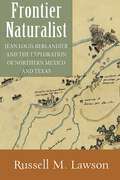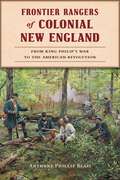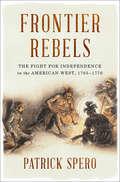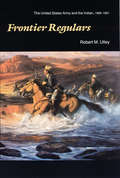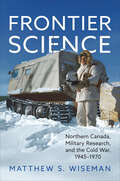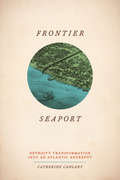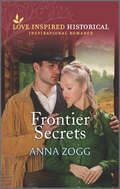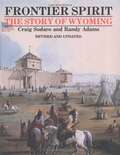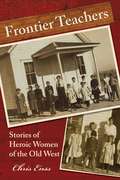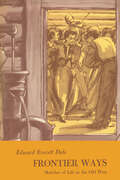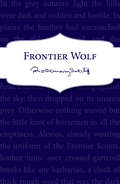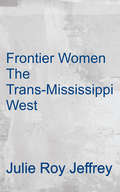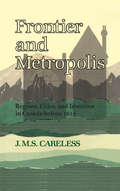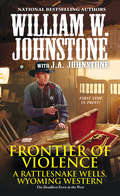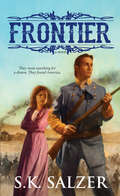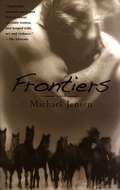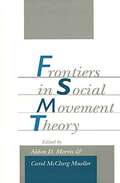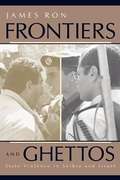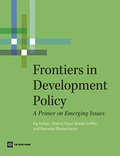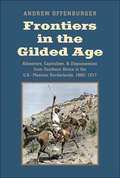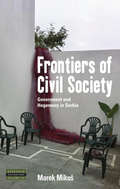- Table View
- List View
Frontier Naturalist: Jean Louis Berlandier and the Exploration of Northern Mexico and Texas
by Russell M. LawsonThis is a true story of discovery and discoverers in what was the northern frontier region of Mexico in the years before the Mexican War. In 1826, when the story begins, the region was claimed by both Mexico and the United States. Neither country knew much about the lands crossed by such rivers as the Guadalupe, Brazos, Nueces, Trinity, and Rio Grande. Jean Louis Berlandier, a French naturalist, was part of a team sent out by the Mexican Boundary Commission to explore the area. His role was to collect specimens of flora and fauna and to record detailed observations of the landscapes and peoples through which the exploring party traveled. His observations, including sketches and paintings of plants, landmarks, and American Indians, were the first compendium of scientific observations of the region to be collected and eventually published.Here, historian Russell Lawson tells the story of this multinational expedition, using Berlandier&’s copious records as a way of conveying his view of the natural environment. Lawson&’s narrative allows us to peer over Berlandier&’s shoulder as he traveled and recorded his experiences. Berlandier and Lawson show us an America that no longer exists.
Frontier Rangers of Colonial New England: From King Philip's War to the American Revolution (Military)
by Anthony Phillip BlasiWarfare in the WildernessFew images reflect the character of hardy New Englanders like that of the eighteenth-century colonial ranger. Rugged characters such as Robert Rogers, Israel Putnam and John Stark spent much of their lives carving a living out of the harsh wilderness of the region, while later proving themselves in battle against seasoned Abenaki warriors. The Wright and Porter families fought throughout western New England, from skirmishes in Charlestown, New Hampshire, to climactic battles on Lake Champlain and Lake George. From the bloody King Philip’s War battlefields of Massachusetts to the fight for the wilderness of New Hampshire and Vermont, author Anthony Blasi explores the journey from frightened homesteader to toughened wilderness warrior.
Frontier Rebels: The Fight For Independence In The American West, 1765-1776
by Patrick SperoThe untold story of the “Black Boys,” a rebellion on the American frontier in 1765 that sparked the American Revolution. In 1763, the Seven Years’ War ended in a spectacular victory for the British. The French army agreed to leave North America, but many Native Americans, fearing that the British Empire would expand onto their lands and conquer them, refused to lay down their weapons. Under the leadership of a shrewd Ottawa warrior named Pontiac, they kept fighting for their freedom, capturing several British forts and devastating many of the westernmost colonial settlements. The British, battered from the costly war, needed to stop the violent attacks on their borderlands. Peace with Pontiac was their only option—if they could convince him to negotiate. Enter George Croghan, a wily trader-turned-diplomat with close ties to Native Americans. Under the wary eye of the British commander-in-chief, Croghan organized one of the largest peace offerings ever assembled and began a daring voyage into the interior of North America in search of Pontiac. Meanwhile, a ragtag group of frontiersmen set about stopping this peace deal in its tracks. Furious at the Empire for capitulating to Native groups, whom they considered their sworn enemies, and suspicious of Croghan’s intentions, these colonists turned Native American tactics of warfare on the British Empire. Dressing as Native Americans and smearing their faces in charcoal, these frontiersmen, known as the Black Boys, launched targeted assaults to destroy Croghan’s peace offering before it could be delivered. The outcome of these interwoven struggles would determine whose independence would prevail on the American frontier—whether freedom would be defined by the British, Native Americans, or colonial settlers. Drawing on largely forgotten manuscript sources from archives across North America, Patrick Spero recasts the familiar narrative of the American Revolution, moving the action from the Eastern Seaboard to the treacherous western frontier. In spellbinding detail, Frontier Rebels reveals an often-overlooked truth: the West played a crucial role in igniting the flame of American independence.
Frontier Regulars: The United States Army and the Indian, 1866-1891
by Robert M. UtleyIn Frontier Regulars Robert M. Utley combines scholarship and drama to produce an impressive history of the final, massive drive by the Regular Army to subdue and control the American Indians and open the West during the twenty-five years following the Civil War. Here are incisive accounts of the campaign directed by Major General William Tecumseh Sherman—from the first skirmishes with the Sioux over the Bozeman Trail defenses in 1866 to the final defeat and subjugation of the Northern Plains Indians in 1890. Utley's brilliant descriptions of military maneuvers and flaming battles are juxtaposed with a careful analysis of Sherman's army: its mode of operation, equipment, and recruitment; its lifestyle and relations with Congress and civilians.Proud of the United States Army and often sympathetic toward the Indians, Utley presents a balanced overview of the long struggle. He concludes that the frontier army was not "the heroic vanguard of civilization" as sometimes claimed and still less "the barbaric band of butchers depicted in the humanitarian literature of the nineteenth century and the atonement literature of the twentieth." Rather, it was a group of ordinary (and sometimes extraordinary) men doing the best they could.
Frontier Science: Northern Canada, Military Research, and the Cold War, 1945–1970
by Matthew WisemanBetween 1945 and 1970, Canada’s Department of National Defence sponsored scientific research into the myriad challenges of military operations in cold regions. To understand and overcome the impediments of the country’s cold climate, scientists studied cold-weather acclimatization, hypothermia, frostbite, and psychological morale for soldiers assigned to active duty in northern Canada. Frontier Science investigates the history of military science in northern Canada during this period of the Cold War, highlighting the consequences of government-funded research for humans and nature alike. The book reveals how under the guise of “environmental protection” research, the Canadian military sprayed pesticides to clear bushed areas, used radioactive substances to investigate vector-borne diseases, pursued race-based theories of cold tolerance, and enabled wide-ranging tests of newly developed weapons and equipment. In arguing that military research in northern Canada was a product of the Cold War, Matthew S. Wiseman tackles questions of government power, scientific authority, and medical and environmental research ethics. Based on a long and deep pursuit of declassified records, archival sources, and oral testimony, Frontier Science is a fascinating new history of military approaches to the human-nature relationship.
Frontier Seaport: Detroit's Transformation into an Atlantic Entrepôt (American Beginnings, 1500-1900 Ser.)
by Catherine CanganyDetroit’s industrial health has long been crucial to the American economy. Today’s troubles notwithstanding, Detroit has experienced multiple periods of prosperity, particularly in the second half of the eighteenth century, when the city was the center of the thriving fur trade. Its proximity to the West as well as its access to the Great Lakes and the St. Lawrence River positioned this new metropolis at the intersection of the fur-rich frontier and the Atlantic trade routes. In Frontier Seaport, Catherine Cangany details this seldom-discussed chapter of Detroit’s history. She argues that by the time of the American Revolution, Detroit functioned much like a coastal town as a result of the prosperous fur trade, serving as a critical link in a commercial chain that stretched all the way to Russia and China—thus opening Detroit’s shores for eastern merchants and other transplants. This influx of newcomers brought its own transatlantic networks and fed residents’ desires for popular culture and manufactured merchandise. Detroit began to be both a frontier town and seaport city—a mixed identity, Cangany argues, that hindered it from becoming a thoroughly “American” metropolis.
Frontier Secrets
by Anna ZoggA woman seeking a new future.A cowboy with a shadowed past.Untamed Wyoming is nothing like polished, restrictive Chicago—that’s why Ellie Marshall likes it. On her uncle’s ranch, she’s free. Free to practice her calling in medicine. Free to finally connect with her uncle. Free to explore her feelings for mysterious cowboy Rhett Callaway. In this strange place, Rhett is her constant—the one she trusts to help and protect her…especially when sinister machinations on the ranch come to light. But will Rhett’s murky past drive him away just when Ellie needs him most?
Frontier Socialism: Self-Organisation and Anti-Capitalism (Marx, Engels, and Marxisms)
by Monica Quirico Gianfranco RagonaConsidering the history of workers' and socialist movements in Europe, Frontier Socialism focuses on unconventional forms of anti-capitalist thought, particularly by examining several militant-intellectuals whose legacy is of particular interest for those aiming for a radical critique of capitalism. Following on the work of Michael Löwy, Quirico & Ragona identify relationships of “elective affinity” between figures who might appear different and dissimilar, at least at first glance: the German Anarchist Gustav Landauer, the Bolshevik Alexandra Kollontai, the German communist Paul Mattick, the Italian Socialist Raniero Panzieri, the Greek-born French euro-communist Nikos Poulantzas, the German-born Swedish Social Democrat Rudolf Meidner, and the French social scientist Alain Bihr as well as two historical struggle experiences, the Spanish Republic and the Italian revolutionary group “Lotta continua”. Frontier Socialism then analyzes these thinkers' and experiences’ respective paths to socialism based on and achieved through self-organization and self-government, not to build a new tradition but to suggest a path forward for both research and political activism.
Frontier Spirit: The Story of Wyoming (Revised and Updated)
by Randy Adams Craig SodaroWyoming has one of the most exciting histories of any western state. Authors Craig Sodaro and Randy Adams are born story-tellers who exemplify the maxim that good history is never dull. From prehistory through the Indian wars, from the wild years of territorial Wyoming up to the conflicts and coming of age in the twentieth century, Wyoming's past comes to life in these pages. The emphasis of the book is on the people of Wyoming, how they lived and what they lived for, how events outside the state affected them, and how they affected the rest of the world. The authors expertly draw connections among seemingly widely separated events to illuminate the seamlessness of history's web. By developing a deeper understanding of the past, the reader comes away with a greater sense of the state's identity today. The title, "Frontier Spirit," was not chosen lightly; probably more than any other state in the lower forty-eight, Wyoming still typifies that spirit. This book shows why.
Frontier Teachers: Stories of Heroic Women of the Old West
by Chris EnssFrontier Teachers tells the stories of a dozen courageous, intrepid women who faced down rooms full of children on the open prairies and in the mining towns of the Old West to bring them educational opportunities.
Frontier Want Ad Bride
by Lyn CoteBride by Mail Mail-order bride Judith Jones has barely arrived in Pepin, Wisconsin, before she's whisked away to prepare for her wedding to Asa Brant. Though something about Asa seems so familiar, how do two strangers become husband and wife? Especially when Judith senses Asa's hidden sorrow. His kindness in helping two young orphans could win her heart...if only he'd open up to her. Determined to start over after four years of brutal war, Asa moved away and sent for a mail-order bride. He had no idea the woman answering his ad would be the sister of his former soldier in arms. The less he reveals, the fewer painful memories there are to confront. But Judith's compassion-and two loving children-might just show them the path to true happiness...
Frontier Ways: Sketches of Life in the Old West (Personal Narratives of the West)
by Edward Everett DaleEdward Everett Dale gives a first-hand account of the way pioneer families and cowboys of the frontier lived. Dale has lived in a sod house, and he once rode the range as cook to a group of cowboys. In this book he draws on his varied experiences to describe all aspects of frontier life—the building of a home, the problems of finding wood and water, the procuring and cooking of food, medical practices, and the cultural, social, and religious life of pioneer families.
Frontier Ways: Sketches of Life in the Old West (Personal Narratives of the West)
by Edward Everett DaleThe classic account of what day-to-day life was like for cowboys and pioneer families in the American West. Born in a log cabin in 1879—Edward Everett Dale sought education and become a prolific and versatile professional writer—but always remained rooted in his close connection to the frontier. He lived in a sod house, and once rode the range as cook to a group of cowboys. His life experiences brought exceptional authenticity to his work, including this classic first-hand account of the way pioneers lived. In Frontier Ways he describes all aspects of frontier life: the building of a home, the problems of finding wood and water, the procuring and cooking of food, medical practices, and the cultural, social, and religious life of pioneer families. Lively and involving, this collection of his essays has allowed generations of readers to look back on the West&’s fascinating past. &“At times [Dale] was the serious scholarly research-bent historian, but more often he was the folklorist, humorist, on-the-spot frontier reporter.&” —Great Plains Journal
Frontier Wolf
by Rosemary SutcliffAs punishment for his poor judgment, a young, inexperienced Roman army officer is sent to Northern England to assume the command of a motley group known as the Frontier Wolves.
Frontier Wolf
by Rosemary Sutcliff'We are the scum and the scrapings of the Empire. They tipped out the garbage-bin of the Eagles to make us what we are.'In disgrace after a mistake that cost the lives of half his men, Alexios arrives in Castellum. It's his first command, but it isn't really a promotion. The Frontier Wolves who man this outpost in the far north of Roman Britain are a fierce and savage bunch, a far cry from the regular legions he'd served in before. Alexios will only survive if he learns to understand them and win their respect - and he's determined to try.
Frontier Women: The Trans-Mississippi West (American Century)
by Julie R. JeffreyFrontier Women The Trans-Mississippi West 1840-1880
Frontier and Metropolis: Regions, Cities, and Identities in Canada before 1914
by J.M.S. CarelessThe regional character of Canada and the crucial role of metropolitan development in its history have been recurring themes in the work of J.M.S. Careless. In these essays he returns to those themes, discussing how national and regional identity in Canada show vital links with metropolitan-hinterland relationship across time and space.The first essay presents an overall appraisal of the historic connections between metropolitan centres and frontiers or regions in Canada. These connections might be manifested in economic structures, political fabrics, or social networks, and also in modes of opinion and popular images and traditions. The second part of the book inquires into some major conceptual treatments given to frontier and metropolis in history. The third seeks to evaluate the impact of metropolitanism on distinctive features of identity that are revealed in Canadian historical experience. A fourth essays rounds out the volume by discussing the influence of external metropolanism in Canada.Careless endows his subject with the combined fornce of his own continuing research, his sensitivity to the new historical scholarship, and the lively and penetrating mind that have made him one of Canada's leading historians for more than thirty years.
Frontier of Violence (Rattlesnake Wells, Wyoming #2)
by William W. Johnstone J. A. JohnstoneJohnstone Justice. What America Needs Now. Welcome to the most dangerous town in the West. For Marshal Bob Hatfield, that means rough justice and a hundred ways to die . . . In the shadow of the Prophecy Mountains, the ramshackle boomtown of Rattlesnake Wells draws schemers, predators, and desperate pilgrims. As for the law, that’s the town marshal, a former Texas outlaw trying to make a new life for himself. But Sundown Bob Hatfield knows a man who’s slick on the draw can’t escape trouble for long. In Rattlesnake Wells, you fight fire with fire—and a new one has just exploded. An enterprising saloon owner stages a shooting contest with a matched pair of gold-plated revolvers as first prize. But some contestants don’t play by the rules, and these aren’t just any old gold-plated guns. Now the guns are gone, innocent hostages have been taken for a violent ride, and a chase is on into the vast Wyoming wilderness—where a terrifying dark secret will be exposed, much blood will be spilled, and a fast-gun marshal will bring the real outlaws to their knees . . .
Frontier: Frontier Trilogy 1 (Frontier #1)
by S.K. SalzerThey went searching for a dream. They found America.The first in a trailblazing trilogy of the brave men and women who risked their lives to build a future in the untamed heart of the American frontier… Fort Kearney, Nebraska, is the gateway to the west for a new breed of pioneers. Civil War veterans and widows, card sharps and Indian agents, and drifters—they arrive every day hoping to forge their destiny. Colonel Henry B. Carrington of the U.S. Calvary is assigned the unenviable task of securing a trio of forts in the dangerous Dakota Territory. At his command is a rising young officer Mark Reynolds and his spirited bride Rose, who longs for danger and excitement. Her wish comes true when army scout Jack Gregory learns that three native tribes are preparing to defend their land against Carrington’s troops. As the drums of war intensify, Gregory takes off on a deadly mission of his own, Rose risks temptation in the arms of an army surgeon, and Carrington faces the greatest foe he has ever known… Now, at a lonely outpost in the foothills of the Bighorn Mountains, they must make one final stand. The fate of a nation—and the history of America—will be written in blood.
Frontiers
by Michael JensenThe year is 1797. John Chapman, an impulsive young man and a sexual outlaw, forsaken in the bitter winter of the Allegheny Plateau, clings to his one tenuous dream: to claim a future in the Western outpost. Unarmed and near death, Chapman is on the brink of giving up when an unexpected rescue changes his course in life forever, and he discovers the true meaning of survival. The mysterious savior is Daniel McQuay, a loner whose overpowering bond with Chapman is as shifting as a shadow, as dark as the prairie tale he spins for the impressionable young man. For Chapman, McQuay's story of a deranged killer clings to his transient soul like a nightmare, tracking him further south and into the safe haven of a gentle Indian woman named Gwennie. His journey also takes him into the intimate deliverance of Palmer, a brash but irresistibly innocent seventeen-year-old settler. As the three adventurers carve a new life out of the endless wilderness, they face the ultimate enemy, man, in a life-and-death struggle that unfolds in the shadow of a legendary and avenging evil. "Invigorated by hot sex scenes in bathtubs and amid thunderstorms. ... An appealing, well-researched tale, featuring a complicated and winsome hero who finds sexual fulfillment and a hard-won place for himself in a most unforgiving, and beautifully wrought setting." -Publishers Weekly
Frontiers In Social Movement Theory
by Aldon D. Morris Carol McClurg MuellerSocial protest movements such as the civil rights movement and the gay rights movement mobilize and sustain themselves in ways that have long been of interest to social scientists. In this book some of the most distinguished scholars in the area of collective action present new theories about this process, fashioning a rich and conceptually sophisticated social psychology of social movements that goes beyond theories currently in use. The book includes sometimes competing, sometimes complementary paradigms by theorists in resource mobilization, conflict, feminism, and collective action and by social psychologists and comparativists. These authors view the social movement actor from a more sociological perspective than do adherents of rational choice theory, and they analyze ways in which structural and cultural determinants influence the actor and generate or inhibit collective action and social change. The authors state that the collective identities and political consciousness of social movement actors are significantly shaped by their race, ethnicity, class, gender, or religion. Social structure--with its disparities in resources and opportunities--helps determine the nature of grievances, resources, and levels of organization. The book not only distinguishes the mobilization processes of consensus movements from those of conflict movements but also helps to explain the linkages between social movements, the state, and societal changes.
Frontiers and Ghettos: State Violence in Serbia and Israel
by James RonThis is an original and controversial comparison of Serbia and Israel, which critically examines state violence visited upon non-Serbians and Palestinians.
Frontiers in Development Policy
by Shahid Yusuf Raj Nallari Breda Griffith Rwitwika BhattacharyaThe global crisis of 2008-09 has brought to the forefront a plethora of economic and political policy issues. There is a re-opening of discussion on basic economic concepts, appropriate framework for analysis, role of private and public sectors in the economy, structural transformation of economies, human development and managing of growing risks and crises. The purpose of this book has been to bring home the inter-linkages in various parts of the economy and the need for practical policy making to reach development goals while being aware of the instabilities, complexities and downside risks inherent in the nature of a an economy operating in a globalized world. Thematically, this book focuses on two core types of policy: policies that promote strong, sustainable and inclusive growth in low income and middle income developing countries and new and emerging policies that necessitates a discussion amongst policy makers and practitioners. Throughout the book, the authors provide insight in to the different types of policy approaches that can be taken to help the economy grow. Ultimately the book looks to foster discussion amongst policy makers on growth and development.
Frontiers in the Gilded Age: Adventure, Capitalism, and Dispossession from Southern Africa to the U.S.-Mexican Borderlands, 1880-1917 (The Lamar Series in Western History)
by Andrew OffenburgerThe surprising connections between the American frontier and empire in southern Africa, and the people who participated in both This book begins in an era when romantic notions of American frontiering overlapped with Gilded Age extractive capitalism. In the late nineteenth century, the U.S.-Mexican borderlands constituted one stop of many where Americans chased capitalist dreams beyond the United States. Crisscrossing the American West, southern Africa, and northern Mexico, Andrew Offenburger examines how these frontier spaces could glitter with grandiose visions, expose the flawed and immoral strategies of profiteers, and yet reveal the capacity for resistance and resilience that indigenous people summoned when threatened. Linking together a series of stories about Boer exiles who settled in Mexico, a global network of protestant missionaries, and adventurers involved in the parallel displacements of indigenous peoples in Rhodesia and the Yaqui Indians in Mexico, Offenburger situates the borderlands of the Mexican North and the American Southwest within a global system, bound by common actors who interpreted their lives through a shared frontier ideology.
Frontiers of Civil Society: Government and Hegemony in Serbia (Dislocations #22)
by Marek MikušIn Serbia, as elsewhere in postsocialist Europe, the rise of “civil society” was expected to support a smooth transformation to Western models of liberal democracy and capitalism. More than twenty years after the Yugoslav wars, these expectations appear largely unmet. <P><P>Frontiers of Civil Society asks why, exploring the roles of multiple civil society forces in a set of government “reforms” of society and individuals in the early 2010s, and examining them in the broader context of social struggles over neoliberal restructuring and transnational integration.
